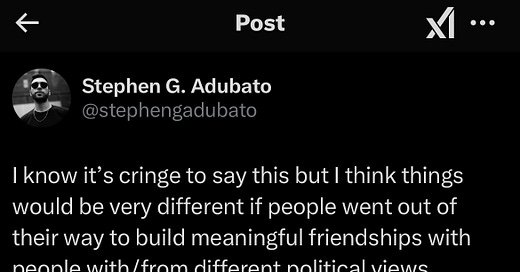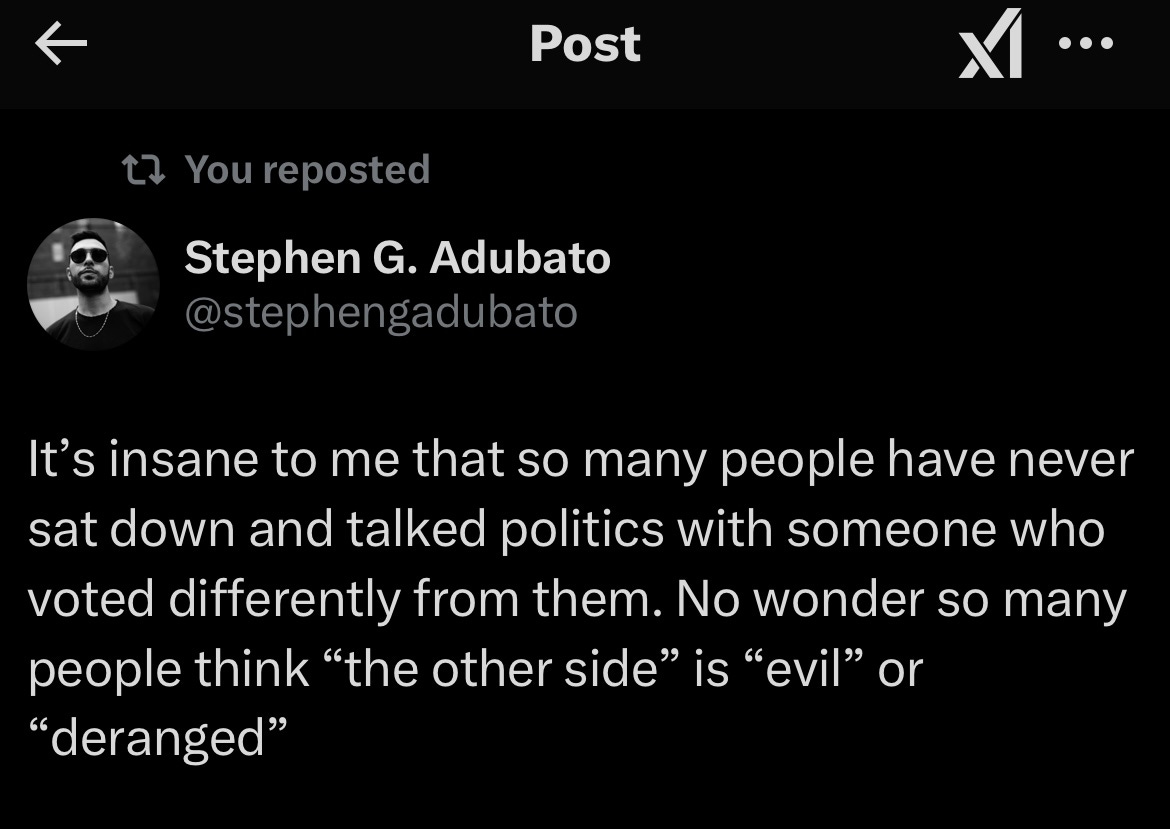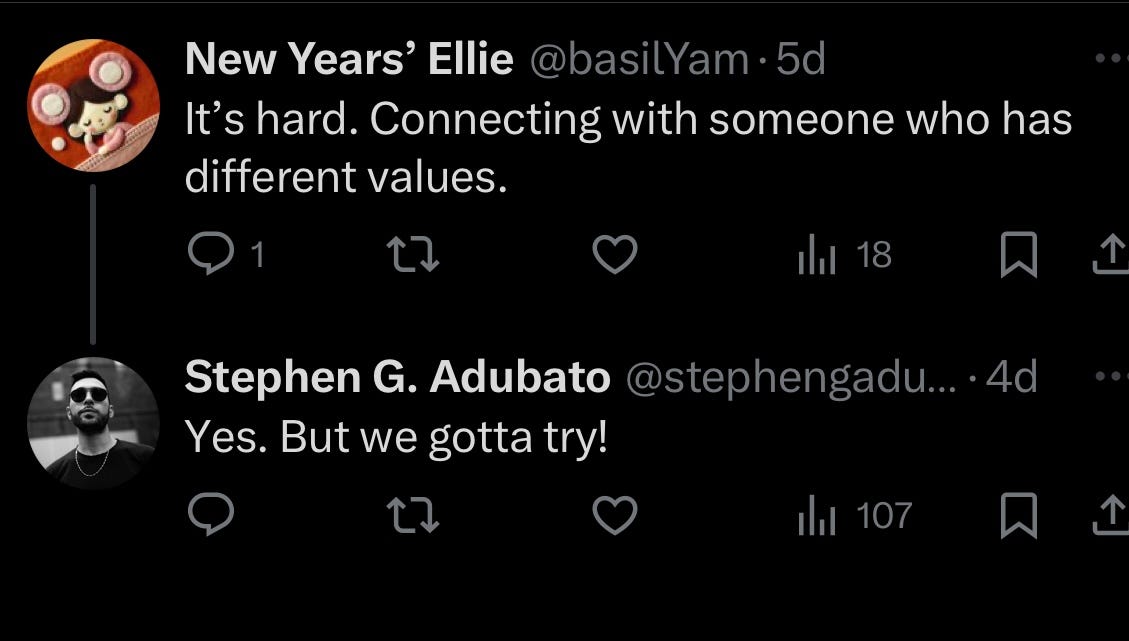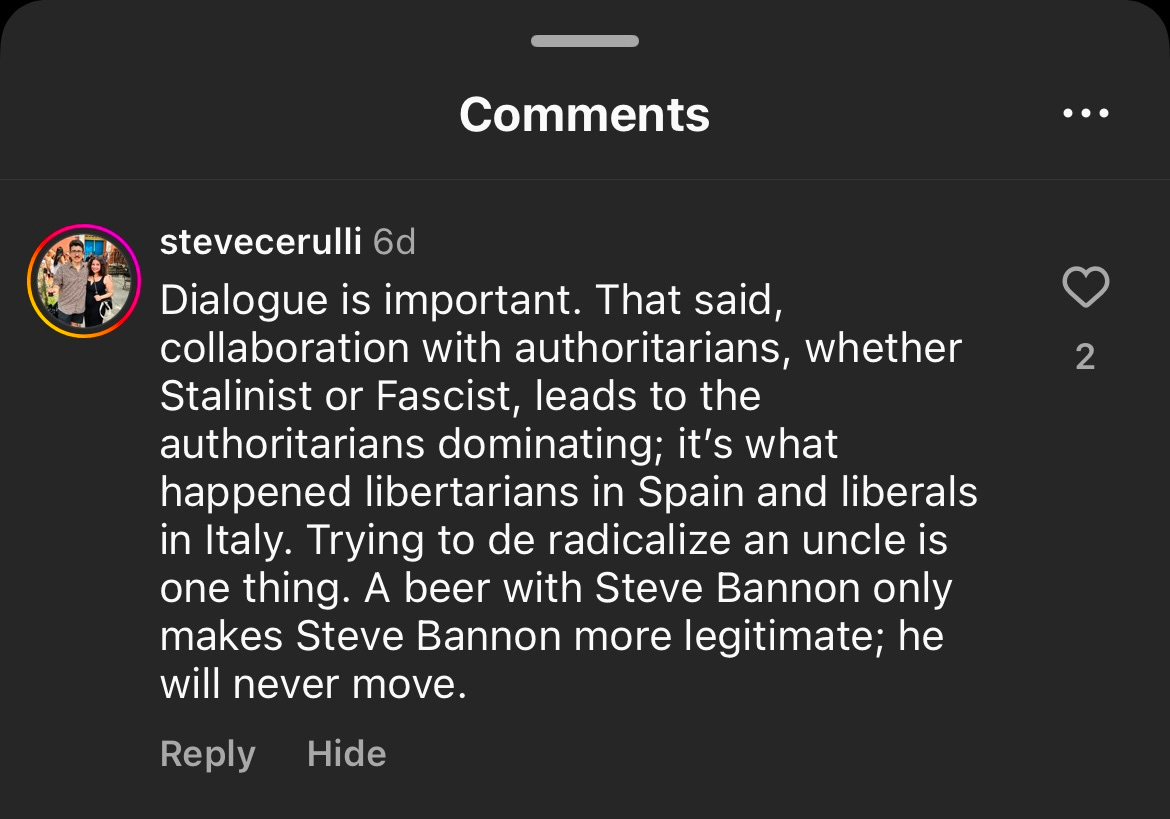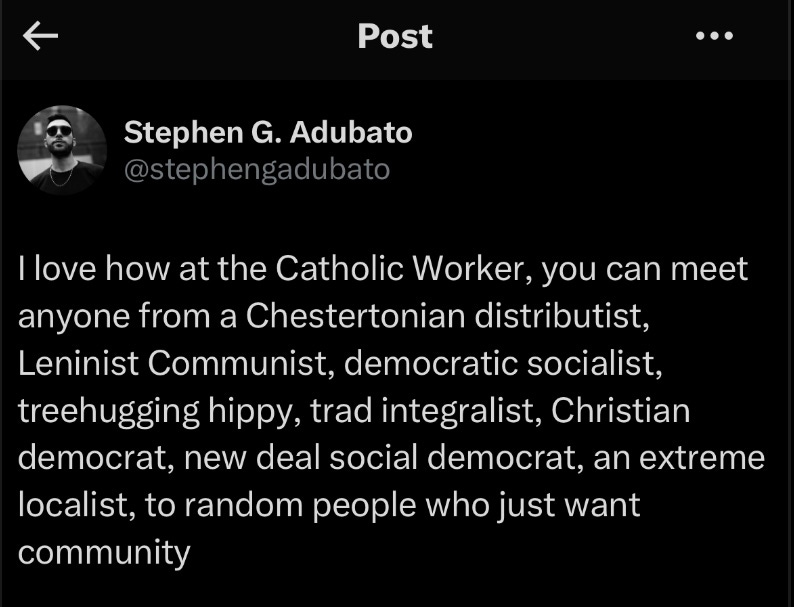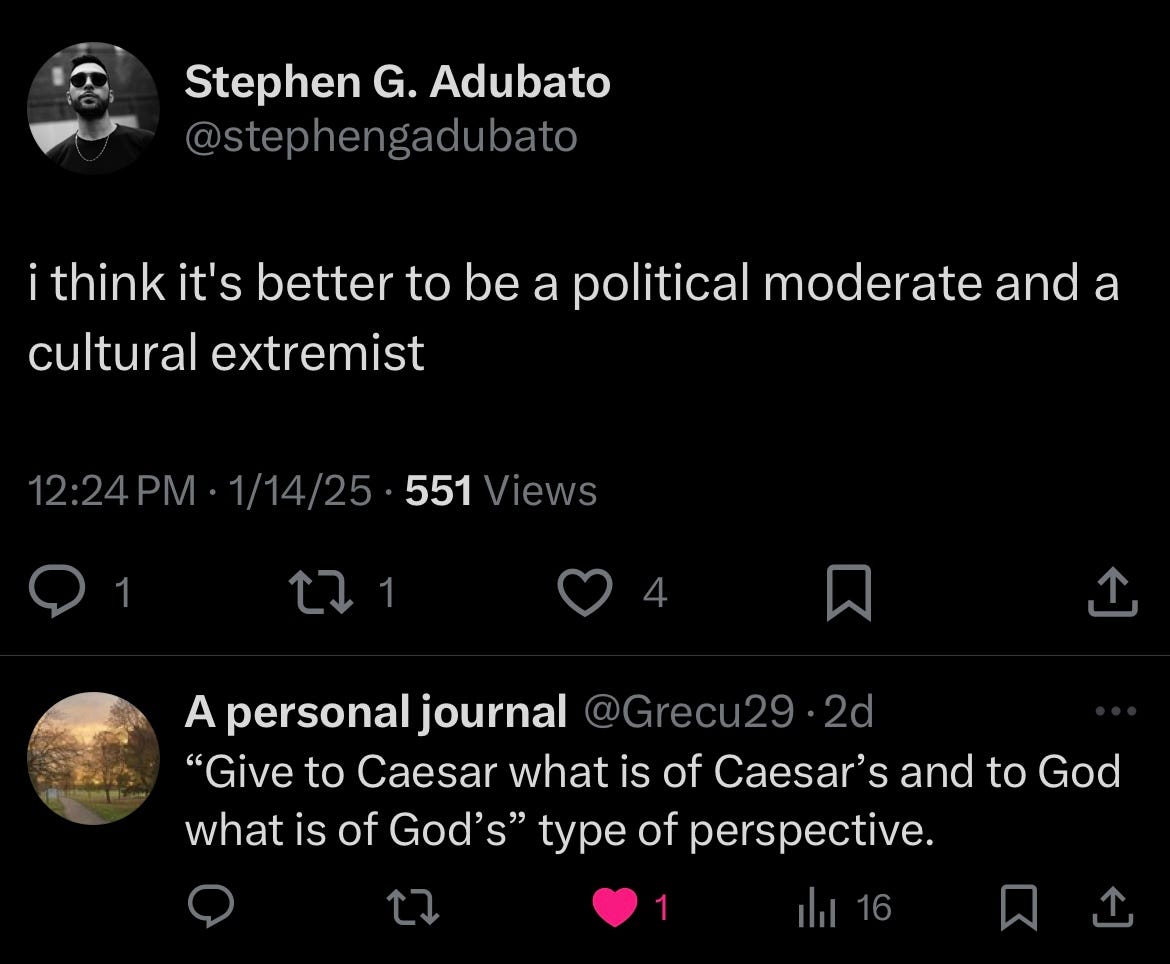First off, you should come to the New York Encounter next weekend (2/14-16). I’m helping curate and present an exhibit on the Mondragon workers’ co-op, an excellent example of subsidiarity, which I mentioned in my post-election piece. We got friend of the pod William T. Cavanaugh speaking about it during our presentation.
Other friends of the pod will be speaking on other topics, including John Milbank and Carlo Lancelotti, as well as other cool people like Antonia Acutis (Carlo’s mom), Robert Putnam (of Bowling Alone fame), Sherry Turkle, and James Davison Hunter.
Come thru. Here’s the full program.
So I tweeted these out:
Several people replied expressing that as much as fostering dialogue/relationships with people different from you is a noble endeavor, it’s easier said than done…but also risks being futile or even dangerous.
I thought I’d expand a little bit on what I meant here.
It’s no secret by now that Cracks in PoMo’s main “political agenda” (if we even have one) is to generate nuanced, stimulating, and spicy conversations among people of a variety of backgrounds/beliefs, but who share being disillusioned with the flatness of mainstream discourse and who are looking for something more lively and, ultimately, more human. We’ve expressed on numerous occasions being horrified by the fact that the discourse is dominated by simplistic narratives constructed by distant, impersonal entities in power—and that so many of us gobble them up as gospel truth. When this becomes the norm, we risk becoming collectively dumber and falling victim to social division—a terrible danger and a denial of God’s design for humanity (communion/solidarity).
We’ve already written extensively about this issues: Take my pieces on the Jesuits who defended La Dolce Vita, celebrity political endorsements, my review of Musa al-Gharbi’s book, and the intro to the zine vol. ii, and
’s piece on virtue signaling post October 7th.2 Trumpies, 1 anti-Trumpy, and 2 Third Partiers walk into a bar…
Part of what inspired me to fire off these tweets was a conversation with friends at a dinner post-election day at which two voted for Trump, two voted third party, and one voted for Harris (and then there was me). When the two Trumpies revealed who they voted for, the third partiers asked them why, and then coolly expressed why they didn’t vote for him. The one Harris pal—a victim of Trump Derangement Syndrome—still believes that the narrative that Trump is a big orange meanie and that anyone who votes for him is evil, or severely ignorant. Thus his utter bafflement upon finding out that two of his close friends voted for him. He couldn’t seem to wrap his head around the logic they were using—something was short circuiting…while the rest of us were able to comprehend their logic, while still disagreeing.
I asked him if he’s ever spoken to Trump supporters, or engaged with media put out by journalists/outlets that were partial to Trump, or at least not to the Democratic Party. To my shock, he genuinely believed that attempting to understand the logic of those who support an evil person was not only a waste of time, but made him complicit with Trump’s wicked ways.
Or take a relative of mine who doesn’t realize how elitist it is when she speaks disparagingly of “white trash” Trump supporters for not having college degrees and having low paying jobs.
Call me naive, but I was in shock that someone in 2024 could still fall victim to TDS, and be completely ignorant of the reasons why someone would support him—which is to say, they know nothing at all about his policy platform (aside from immigration).
But it’s not just anti-Trump people. It’s Trump’s worshippers…many of whom believe that Harris was actually a communist. Or take my friends who don’t understand why BIPOCs think Trump is racist. “He’s actually done a lot to help black people!” That might (or might not) be the case. But he has also given license to racist people to unleash their ignorance and harass BIPOCs.
Really, it’s the same with anyone who blindly believes any other simplistic narratives spewed out by the media. Some of my friends’ dumb comments about Muslims, queers, trannies, and working class people reflect that they don’t actually know any Muslims, queers, trannies, or working class people.
It’s easier to live in our silos
Needless to say, when we stay around likeminded people, we risk siloing ourselves from the rest of society—thus ceding over more power to the engineers of the discourse.
I’m very grateful to talk on a daily basis with friends who are trad Caths and heterodox lib Caths, and people who are in various lay movements; Muslims and Jews, atheists and “searchers,” people who do astrology; people who voted for people including Trump, Harris, Sonski, and West, as well as people who abstained from voting; people from Europe and from Central America, people from New York and New Jersey and from Minneapolis and LA, black Americans, Latinos of many shades, Africans, WASPs, and southeast Asians; people with PhDs and JDs and cleaning ladies and constructions workers; people who speak a variety of languages; people who are very actively gay and people who are celibate, childless couples and couples with 11 kids.
But of course, venturing out to foster relationships with people with different political or religious beliefs, from a different racial or ethnic background, from a different locale or socioeconomic class, is not easy for everyone. Not everyone is capable of entering in contentious conversations, ready to detach from their emotions and suspend their judgement. Some are not intelligent enough to do so. Some don’t have the patience. Some are too busy working their a*ses off in order to pay their bills and make ends meet. Some have very small social networks. Some are triggered by these conversation because of their baggage from trauma and abuse. Some have more at stake than others (especially people are visibly minorities).
Others believe attempting to foster these dialogues is a waste of time—especially when it comes to those who are extremely ignorant or who have malice in their hearts. Of course, we need to be prudent, we have to have healthy boundaries and must discern the spirits (as Pope Francis has said on numerous occasions, “don’t converse with the devil”). Sometimes, it may be better to keep a distance from certain people—especially people who are mentally unstable (due to their trauma or actual mental illness) or who seem demonically “possessed” (whether literally or figuratively) by a certain political ideology (I find this most often with self-avowed racists and fascists, as well as anti-fascists and anti-racists—they have more in common with each other than they are willing to admit).
Someone’s gotta be the Daryl Davis
But such a decision should stand outside the norm. And we should aspire to be in dialogue with them at some point (and should pray spiritually to be in communion with them). At the end of the day, trying to live in actual communion with any other human being is risky, sometimes futile…almost as much as letting people kill you on a cross. But someone’s gotta play the holy fool. Someone’s gotta be the Daryl Davis (for real tho…you can call him crazy, but how many klansmen have you converted with your black square on IG?)…or the Stella Tsantekidou who converses with a lonely autistic internet fascist (read the whole conversation).
Even when your attempt to forge communion crashes and burns, blows up in your face, can we really say your attempt was completely in vain…that it was a total failure? Who are we to say that the seed of truth and love you attempted to plant won’t remain…and maybe one day take root and blossom? If no one talks to (or at least sincerely prays for) the person whose heart is tarnished by racism, to the lonely internet fascist, to the SJW or Trump worshipper, how will they ever come to find the light? Surely, we can rely on power to deplatform and punish such problematic people—which might at times be necessary—but that’s not a substitute for converting their hearts.
I say this as someone who has experienced such a crashing and burning of a very meaningful friendship with someone with whom I disagreed about a lot of things, but also loved very deeply—because they were a really beautiful person…severely damaged, but still, a profound soul. Because of the gravity of their wounds, they couldn’t handle someone—especially someone with beliefs different from their own—loving them…and thus resorted to calling me a fascist, and demanding that unless I publicly renounced my views, couldn’t ever speak to me again (at least not in this lifetime).
Needless to say, this hurt. Many people warned me that being friends with someone like this was not gonna end up anywhere good. But I firmly believe that this friendship wasn’t a waste of time. And I pray that the moments of beauty and communion we shared will remain in that person’s heart...and that they will reach their total realization in the next lifetime.
Sappy…I know. But I genuinely believe it. No one emerges from love unscathed. Thus, we should be prepared to risk getting wounded in our pursuit of a communion and solidarity…or at least we should aspire to, rather than resorting to the cozier, self-indulgent options of tribalism and the puritanical avoidance of guilt by association.
On that note, we should all go to the Catholic Worker so we can meet an array of people with diverse ideological beliefs who desire the common good (which I’ve written about here, and
has written about here).Also the world would probably be a better place if this were the case:
:

